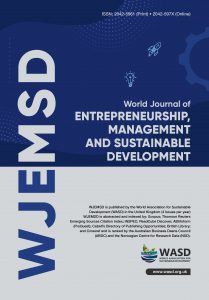Sustainable Entrepreneurship in Textile-Based SMEs: Linking Entrepreneurial Traits to Firm Performance, Dr Arya Kumar, Asokan Vasudevan, Dr Srilalitha Sagi, Prof Sowmya
Dr Arya Kumar 
Assistant Professor (II)
School of Economics and Commerce, Kalinga Institute of Industrial Technology
India
ORCID:0000-0002-8203-361X
Asokan Vasudevan
Faculty of Business and Communications
INTI International University
Malaysia
ORCID:0000-0002-9866-4045
Dr Srilalitha Sagi
Associate Professor
GITAM School of Business
India
ORCID:0000-0003-0083-2272
Prof K.R.Sowmya
Department of Management Studies, Vel Tech Rangarajan Dr Sagunthala R&D Institute of Science and Technology
India
ORCID: 0000-0003-4239-2586
Type of Paper: Research
Purpose:This research explores how sustainable entrepreneurship practices (SEP) mediate firms' performance and the Individual Entrepreneurial Orientation (IEO) of textile-based SMEs in Odisha.
Research Context:The research targets SMEs in the weaving sectors of Odisha, specifically Berhampur and Sambalpur, which are renowned for their unique handloom traditions. It explores the entrepreneurial traits of proactiveness, risk-taking, and innovativeness as determinants of sustainable practices and firm performance.
Design:Data from 431 weavers were analysed using PLS-SEM, broader systemic factors such as market constraints and limited institutional support were found to significantly influence the sustainability of SMEs, necessitating more integrated frameworks for understanding firm performance, its direct effect on performance was not established in this study, suggesting a need for further exploration into its independent contributions.
Findings:Results highlight that innovativeness, proactiveness, and risk-taking are essential for embedding sustainability into SMEs. Creativeness directly enhances firm performance, while SEP fully mediates the effects of proactiveness and risk-taking and partially mediates the effect of innovativeness on performance.
Policy and Practical Implications:The findings underscore the need for targeted policy support and incentives to promote sustainable entrepreneurship. Recommendations includefinancial incentives such as subsidies for adopting eco-friendly technologies can reduce the cost burden on small-scale weavers. Collaborating with local organisations, such as the Odisha Handloom and Handicrafts Development and Promotion Council (OHHDPC), can facilitate market access.
Keywords: SME, Handloom, Firm's Performance, Individual Entrepreneurial Orientation (IEO), Sustainable entrepreneurship practices (SEP), Economic Development.
Citation:Kumar, A., Vasudevan, A., Sagi, S. and Sowmya, K., R. (2026): Sustainable Entrepreneurship in Textile-Based SMEs: Linking Entrepreneurial Traits to Firm Performance,World Journal of Entrepreneurship, Management and Sustainable Development, Vol. 22, Nos 1-2, pp. xx-xx.

